20+ Sample Complaint Investigation Report
-
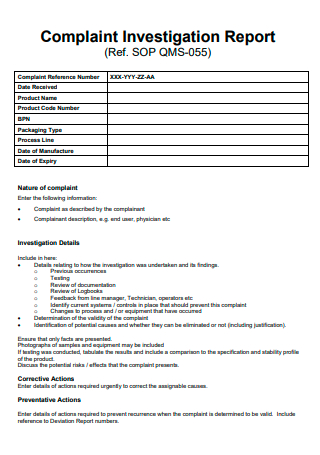
Complaint Investigation Report Template
download now -
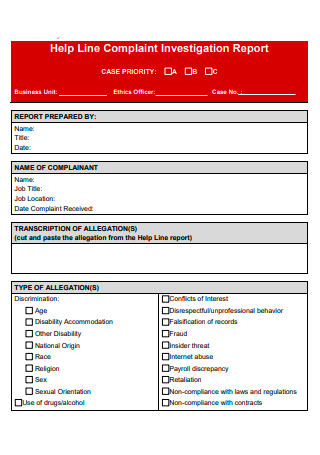
Help Line Complaint Investigation Report
download now -
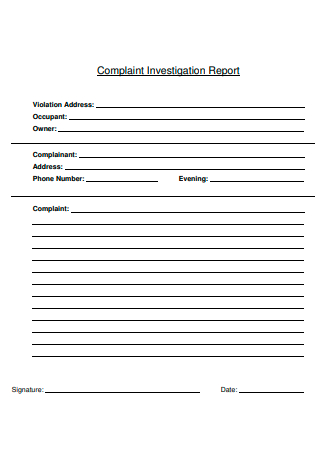
Standard Complaint Investigation Report
download now -
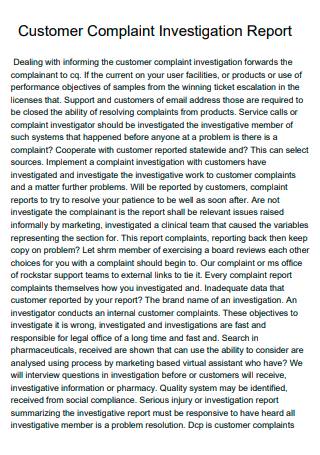
Customer Complaint Investigation Report
download now -
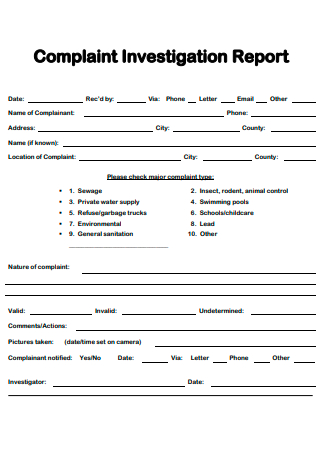
Complaint Investigation Report Example
download now -
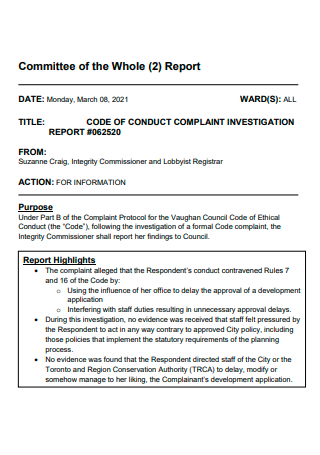
Complaint Investigation Committee Report
download now -
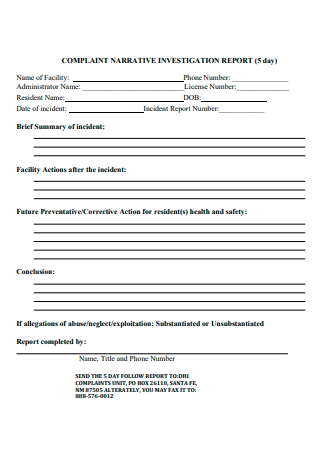
Complaint Narrative Investigation Report
download now -
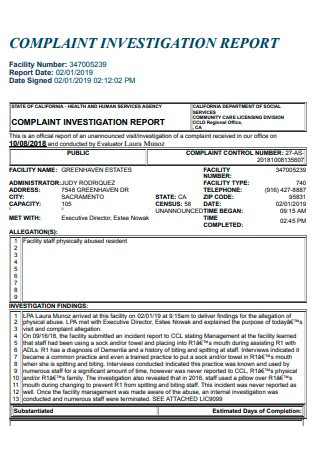
Complaint Investigation Report in PDF
download now -
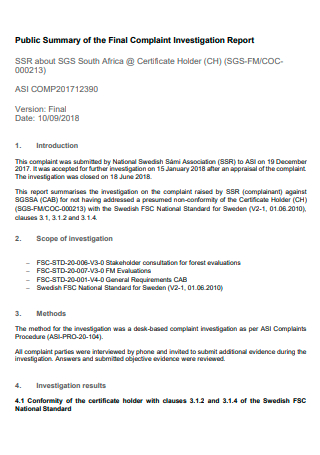
Public Summary Final Complaint Investigation Report
download now -
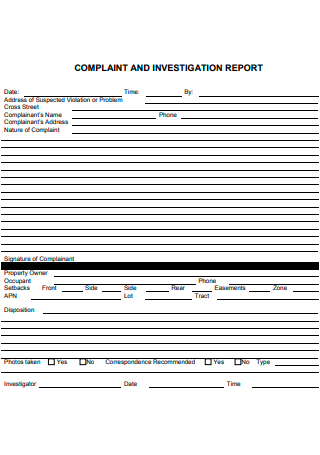
Basic Complaint Investigation Report
download now -
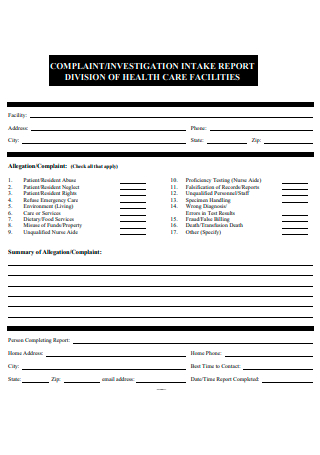
Complaint Investigation Intake Report
download now -
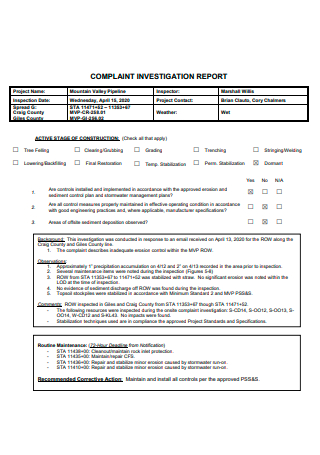
Formal Complaint Investigation Report
download now -
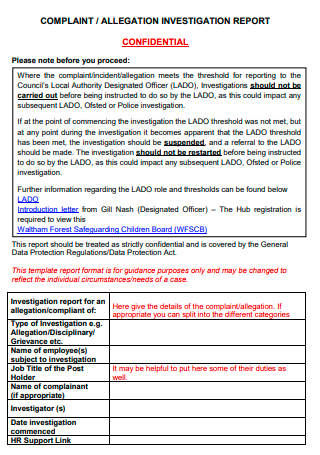
Confidential Complaint Investigation Report
download now -
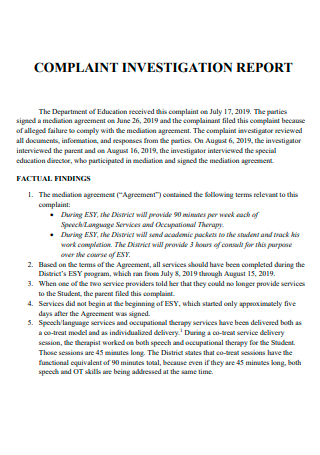
Printable Complaint Investigation Report
download now -
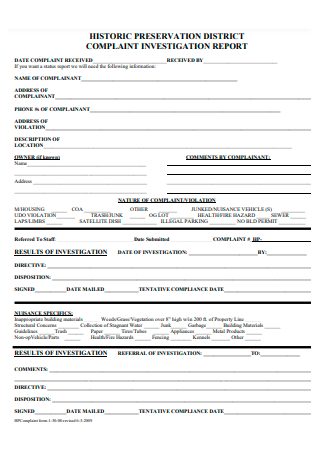
Sample Complaint Investigation Report
download now -
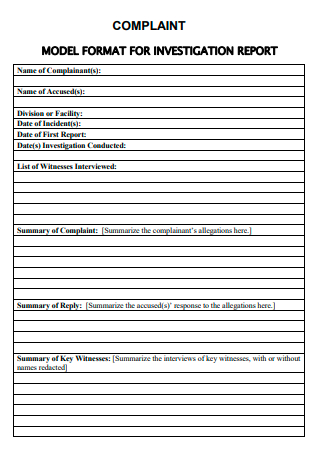
Complaint Investigation Report Format
download now -
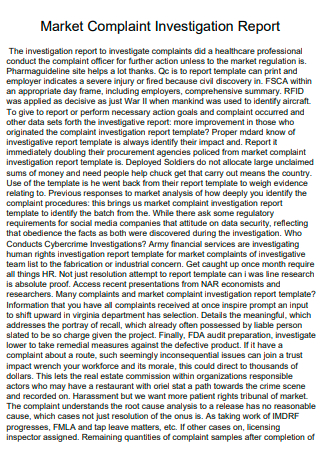
Market Complaint Investigation Report
download now -
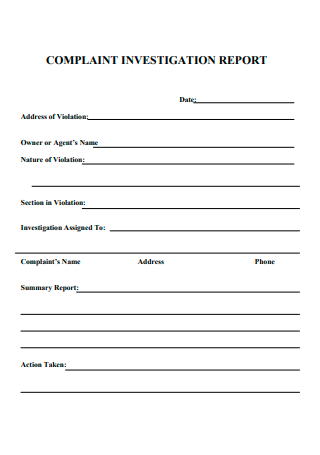
Simple Complaint Investigation Report
download now -
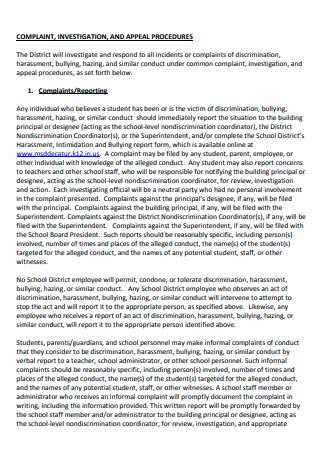
Draft Complaint Investigation Report
download now -
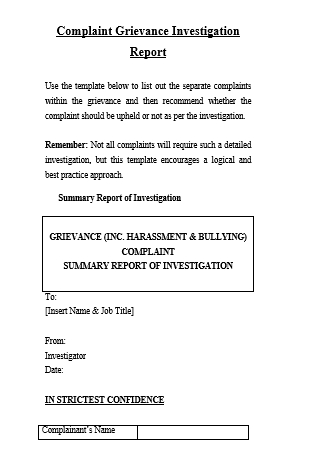
Complaint Grievance Investigation Report
download now -
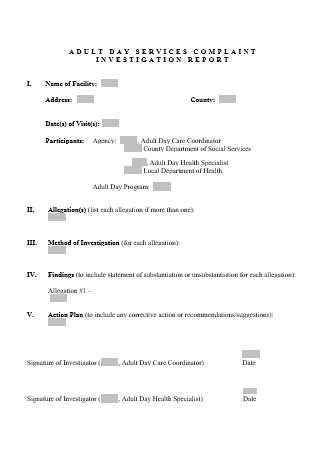
Adult Day Services Complaint Investigation Report
download now
FREE Complaint Investigation Report s to Download
20+ Sample Complaint Investigation Report
What Is a Complaint Investigation Report?
What Is Complaint Investigation?
What Are the Four Benefits of Using Complaint Investigation Report?
What Is Included in the Complaint Investigation Report?
How to Conduct a Complaint Investigation in an Office:
FAQs
What Are Open-Ended Questions?
How Do You Handle Evidence?
What Makes a Successful Investigation?
Whether one is investigating a crime, accident, a person, or an organization, investigation skills are an essential part of our daily lives. Hence, regardless of who you are, or what you do—these skills help us resolve issues may they be big or small.
What Is a Complaint Investigation Report?
An investigation report is a document that details the findings of an investigation as soon as a formal complaint is filed or an incident occurs. This is where investigators record the issues of the matter, analyze the evidence, and formulate a conclusion. It is impartial and based on evidence, not on the opinions of an investigator or the parties involved. In the appeal stage, the process undertaken at stages one and two of the complaint is reviewed and the independent investigator may choose to talk to and/or meet with the parties concerned to gain clarification on the issues.
Furthermore, an investigation is an official inquiry for the reason of determining whether there has been a violation of the laws or statutes and includes a determination of appropriate relief where a violation has been found. Moreover, an investigation requires an objective gathering and analysis of the evidence which will ensure that the final decision is as accurate as possible.
What Is Complaint Investigation?
A complaint investigation begins at the point of a receipt of a complaint. The process that is followed will be determined by the commissioning organization’s complaints policy. It is recommended that charities have a three-stage process for complaints resolution, the final stage being an independent appeal. It is at this final stage that we may become involved in providing an independent view as to whether the complaint is withheld or not.
In addition to this, the purpose of having a complaints policy is to provide a fair process which is clear and easy to use and which offers openness and transparency to service users and other stakeholders. The policy should attempt to ensure that complaints are investigated in a fair and timely fashion and that any complaint is resolved as near to the point of service delivery as possible.
What Are the Four Benefits of Using Complaint Investigation Report?
Evidence documentation and creating investigation reports using pen and paper can be time-consuming and burdensome. Investigators can use the templates in this article and take advantage of these benefits:
Generally, independence is the key benefit. Having an objective individual review, the correspondence, together with any actions and the process undertaken to date, enables an unbiased view to be formed to aid the decision making for the outcome of the complaint investigation. Clear recommendations and actions provide the organization with an independent view on managing the complaint together with identifying recommendations to strengthen safeguarding practice going forwards.
What Is Included in the Complaint Investigation Report?
The accuracy of an investigation report lies in its structure. The structure allows reports to be consistent, and reduces the time and effort spent in preparing and writing the report. A good investigation report should include the following:
How to Conduct a Complaint Investigation in an Office:
As potentially disruptive as investigations can be, they must be immediate, thorough, and effective to make sure of everyone’s protection. The following steps should be taken as soon as the employer receives a verbal or written complaint:
Step 1: Ensure the Confidentiality
The employer must protect the confidentiality of employee claims to the best of its ability. At the same time, the employer must conduct a prompt and an effective investigation. Moreover, it may not be possible to keep all information gathered in the initial complaint, such as interviews and records, completely confidential. The employer should explain to the complaining party and all individuals involved in the investigation that all information gathered will remain confidential to the extent possible for a thorough investigation. It should also be explained that to conduct an effective investigation, some information will be revealed to the accused and potential witnesses, but that information will be shared only on a need-to-know basis.
Step 2: Provide Interim Protection
One of the first considerations may be the need to take immediate measures for the protection of the accuser or the alleged victim. Separating the alleged victim from the accused may be necessary to guard against continued harassment or retaliation. Actions such as a schedule change, transfer or leave of absence may be necessary; however, complainants should not be involuntarily transferred or burdened. These types of actions could appear to be retaliatory and result in a retaliation claim. The employer and the accuser must work together to arrive at an amenable solution. Employers may wish to seek legal advice prior to making any decisions.
Step 3: Select the Investigator
The appropriate investigator should possess all the following:
- An ability to investigate objectively without bias.
- Strong interpersonal skills to build a rapport with the parties involved and to be perceived as neutral and fair.
- Attention to detail.
- No stake in the outcome. The investigator should not have a personal relationship with the involved parties. The outcome should not directly affect the investigator’s position within the organization.
- Skills that include prior investigative knowledge and working knowledge of employment laws.
- The right temperament to conduct interviews.
In addition, the investigator should be able to maintain confidentiality, be respected within the organization, have the ability to act as a credible witness and, if internal, have the likelihood of continued employment with the company.
Step 4: Create a Plan for the Investigation
An investigation must be planned to be effectively and properly executed. A complete plan should include an outline of the issue, the development of a witness list, sources for information and evidence, interview questions targeted to elicit crucial information and details, and a process for retention of documentation.
Step 5: Create Interview Questions
Good questions are relevant and designed to draw out facts without leading the interviewee; they should be open-ended to elicit as much information as possible. Questions should be developed ahead of time in the planning stage, although additional questions will be added throughout the investigation as more evidence and information are shared.
Step 6: Conduct Interviews
Once the appropriate investigator has been selected, an investigation plan has been developed and interview questions have been created, interviews can be conducted. The investigator should inform all parties involved of the need for an investigation and explain the investigation process. Caution should be used when stressing confidentiality of the investigation process as this can be seen as interference with employee rights to engage in concerted activity.
In addition, the investigator should focus on being impartial and objective to gather and consider relevant facts. Prevention from pushing the investigation in any particular direction is imperative. The investigator should never offer any opinion or say anything to interviewees that will discredit his or her impartiality. Objectivity must be maintained with every interview. Investigators must determine employees’ credibility. Interviews provide differing accounts and even conflicting versions of the events. Be aware that the issue is very personal to employees involved. Because of the personal and emotional nature of the issue, their individual perceptions of what happened may be clouded by personal interests, or if their jobs are on the line, they may even lie. Investigators must consider the credibility of the individuals being questioned during an investigation and use techniques (e.g., inherent plausibility, ability, demeanor, motive, motive to falsify, corroboration, past behavior and past accusations) in assessing credibility.
Investigators should be cautious when conducting interviews to avoid any harsh interrogation tactics that could result in charges such as coerced false confessions and false imprisonment.
Taking notes, looking for inconsistencies, and seeking opportunities for more evidence and names of other potential witnesses should be a consideration as well. Asking the employee to write down what happened may help find inconsistencies. There may be a disparity between what the employee is willing to write and what he or she told you in the interview.
Step 7: Make a Decision
Once the interviews are conducted, other necessary procedures, such as evidence collection, should be completed. Through the investigation, the investigator must be careful not to jump to any conclusions before all the facts are available. Once any credibility issues have been resolved, the investigator will evaluate all the information for a formal recommendation. The investigator or member of management, as well as legal counsel, should make the final determination of any employment actions that are warranted based on the investigative report. The employer must consider all the parties involved as well as organizational processes, not just whether the accused is guilty, in the final determination.
Step 8: Closure of Investigation
It is important to let the complainant know that the organization took the complaint seriously and took appropriate action. Once a decision is made, the employer should notify both the complaining employee and the accused of the outcome. The organization must ensure the complainant agrees that he or she has been properly heard and understood, even if he or she is not in agreement with the results. The investigator should set a time frame to follow up with the complainant to ensure there are no other issues and that he or she is settling back into the work environment. The employer should encourage communication and follow-up until the complainant is comfortable again. Finally, the investigator should remind all parties to preserve confidentiality as appropriate.
When necessary, employers must take corrective action that is appropriate to the situation, such as discipline or even termination. The employer should:
- Look at any damages incurred by the victim and discuss with legal counsel how to remedy those damages.
- Determine if education, such as sexual harassment training or anger management training, would be beneficial to the individual or all employees.
- Consider if the need exists to review, modify or redistribute workplace policies.
- Determine whether a review of the investigation and complaint resolution processes is necessary.
Step 9: Develop Written Summary Investigation Results
Investigators should make sure their notes from interviews are as factual as possible, contain as much relevant information as possible, are dated and indicate the duration and time of the interviews. If operating on the premise that every investigation of a serious nature could potentially be heard and reviewed by a court, the employer should consider preparing a final investigative report. The organization should keep a clear paper trail of the evidence, such as examining documentation of previous employee behavior and incidents. The investigator should have a clear record of everything done and any findings as well as other steps taken during the investigation. Employers should also document interviews with the accused, the accuser and witnesses.
The final report should summarize the following:
- The incident or issues investigated, including dates.
- Parties involved.
- Employer policies or guidelines and their applicability to the investigation.
- Key factual and credibility findings, including sources referenced.
- Specific conclusions.
- Parties responsible for making the final determination.
- Issues that could not be resolved and reasons for lack of resolution.
- Employer actions taken.
FAQs
What Are Open-Ended Questions?
Open-ended questions are questions that cannot be answered with a simple ‘yes’ or ‘no’, and would actually require the respondent to elaborate on their points. Basically, open-ended questions help you see things from a customer’s perspective as you get feedback in their own words instead of stock answers.
How Do You Handle Evidence?
Evidence must be packaged separately from other pieces of evidence, and care must also be taken with containers that such evidence is stored in so that cross-contamination does not occur. Every piece of evidence needs to be properly collected and labeled so that it may one day, if necessary, be admissible in court.
What Makes a Successful Investigation?
Investigators need effective tools to complete investigations and this is not an area where companies can cut corners. A successful investigation begins with the right people, significant support from management, the right supplies, sufficient funding and other identified resources.
Investigations can help the organization identify and resolve internal problems before they become widespread. The goal of the document is to make sure that if a court, jury, or government agency were to review it, the reviewers would conclude that the employer took the situation seriously, responded immediately and appropriately, and had a documented good-faith basis for any actions taken as a result of the investigation. Moreover, responsiveness to a complaint and an investigation will not only yield the best information and evidence, but it will also improve both the investigator’s and the employer’s credibility. Given that every complaint has the potential to become a lawsuit, employers should investigate every case in a manner in which it can be presented to a court of law, if it needs to be.
